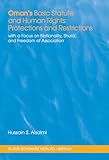Oman's Basic Statute and Human Rights: Protections and Restrictions : With a Focus on Nationality, Shura, and Freedom of Association / Hussain S. Alsalmi.
Material type: TextPublisher: Berlin ; Boston : De Gruyter, [2020]Copyright date: ©2020Description: 1 online resource (347 p.)Content type:
TextPublisher: Berlin ; Boston : De Gruyter, [2020]Copyright date: ©2020Description: 1 online resource (347 p.)Content type: - 9783879974238
- 9783112209004
- 342.5353085 22
- KMQ246
- online - DeGruyter
- Issued also in print.
| Item type | Current library | Call number | URL | Status | Notes | Barcode | |
|---|---|---|---|---|---|---|---|
 eBook
eBook
|
Biblioteca "Angelicum" Pont. Univ. S.Tommaso d'Aquino Nuvola online | online - DeGruyter (Browse shelf(Opens below)) | Online access | Not for loan (Accesso limitato) | Accesso per gli utenti autorizzati / Access for authorized users | (dgr)9783112209004 |
Frontmatter -- Abstract -- Acknowledgements -- Contents -- Table of Oman’s Royal Decrees -- Table of Oman’s Court Decisions, Legal Opinions, and Ministerial Resolutions -- Table of International Standards and Norms -- List of Tables -- Abbreviations -- 1 General Introduction -- Part I: Basic Statute and Human Rights -- 2 Introduction to Oman’s Basic Statute -- 3 Human Rights Protections and Safeguards under the Omani System -- Part II: Human Rights Case Studies: Nationality, Shura, and Freedom of Association -- 4 Omani Nationality and Human Rights -- 5 Democracy, Shura, and Public Participation -- 6 Freedom of Association -- 7 General Conclusion -- Bibliography -- Appendix
restricted access online access with authorization star
http://purl.org/coar/access_right/c_16ec
Recent developments in several Arab states in 2011 in what is now dubbed the 'Arab Spring', have refocused and placed human rights and freedoms norms at the forefront of many Arab states’ agenda. Over the last two decades or so there have been some developments in Gulf States in the areas of human rights and developments. However, substantial oil and gas revenues have served as a basis for social and economic development and Government largesse in providing basic needs has generally kept at bay demands for political freedoms in comparison to other parts of the world. This study seeks to answer the main question: To what extent is the application of human rights and freedoms set forth in the Oman Basic Statute compatible with international conventions? It aims to evaluate the importance of the constitution in Oman, and the extent to which it has succeeded in incorporating international human rights’ standards while walking the tightrope of reconciling this with core traditional social customs and Islamic values. It analyses the compatibility of constitutional and national laws and practice with international human rights standards and assesses current trends and policies. Three case studies for different rights and freedoms are conducted to explore the guarantees and weaknesses of different rights in practice. These are the areas of nationality 'as individual right' which is very important under the Omani system as it is the direct link to enjoyment of other rights and freedoms. The Shura is the second case study as a political right or a collective right which represents public participation in Oman. Finally, the Freedom of Association, as an example for the freedom of expression and opinion, which represents individual and group rights together. This research evaluation analyses in detail the developments since the promulgation of the Basic Statute in December 1996 but stretches to encompass developments till the status to the end of 2011.
Issued also in print.
Mode of access: Internet via World Wide Web.
In English.
Description based on online resource; title from PDF title page (publisher's Web site, viewed 27. Jan 2023)


